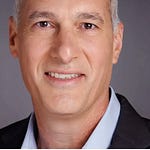Like Steve Jobs, Chris Rea was fired from his own business.
Fired after he had worked very hard to treble the company in just 2.5 years. But let's rewind a little to the beginning of the story. Chris was brought up in a small town in Northern Ireland. He was the son of an Irish Ford garage dealer salesman; his family worked very long hours and they were relatively well-off for the village of about 2,000 people.
He went to Belfast to study but barely scraped a degree at Queen’s University. The enthusiasm just wasn’t there. But that all changed….“when I found business, I found something that interested me. I taught myself accountancy – if you’re in business you need to be numerate. I also found it was important to understand the law and I learned commercial law.”
The listless young man was transformed into a powerhouse entrepreneur, determined to succeed. He worked and saved up for years to buy a 50% share in an industrial manufacturer and business was booming; but just 2.5 years later he hit rock bottom:
“One Friday afternoon, an American distributor gave me notice and had already basically stolen just about all of the people in the business. On Monday morning, I decided to make them regret the day I was born.”
Life had presented him with a challenge so bitter that he at first struggled to move on…”I spent half a lifetime making them very, very sorry. But at some point in time, they became irrelevant to me, and at some point in time, I stopped being angry.”
Chris got back in the game and built a world-class, global greentech company. Now active in 43 countries, AESSEAL builds sealing solutions to reduce energy and water consumption and is leading the charge in net-zero manufacturing.
And the man who fired Chris? In a strange twist of fate, Chris hired him:
“I pursued the guy who fired me to Australia, and about 9 years later I hired him. I remember the good in people a lot longer than I remember the bad. I bumped into him at a restaurant, and I told him, ‘one day they’ll fire you, just like they fired me. But you know where the bodies are buried, I don’t. You could add value to my business. Remember this day when you leave or they fire you. Give me a call.
“A few years later he was fired and he gave me a call. They had excluded him from every part of the global business except America. So I sent him to America. He had energy and enthusiasm and he did a great job.”
AESSEAL has invested hundreds of hours in understanding the journey to net-zero and set up Better.World Solutions to help companies do the same.
How do you tackle company emissions?
Scope 1 emissions are gas and diesel
Scope 2 emissions are electricity
Scope 3 emissions are emissions in your supply chain
Our scope 3 global emissions are about 112,000 tonnes – that’s our supply chain, and our avoidance is somewhere between 2-5 million tonnes. Our products cost much less to produce than a car does, and they create vastly more CO2 benefits savings for the customer. But we couldn’t be bothered counting it because it won’t add any benefit to the planet whatsoever if we count up our avoidance.
An electric car manufacturer has negative scope 3 emissions because they’re making the car – it’s avoidance based on their customers avoiding the use of petrol and diesel whenever they drive the car.
How do you offset emissions?
We have offsets for our scope 1 and 2 emissions. Offsets are currently very cheap; 57 Euros a tonne in the European trading scheme, which we abandoned when we left the EU. And I believe they’ll end up being about £100 a tonne in the fullness of time.
There are carbon offsetting schemes in various parts of the world – they’re accredited by the carbon trust.
What advice would you give to companies going net-zero?
Join Betterworld.Solutions which is a best practice sharing organisation. It's completely free, it's philanthropic.
The main points of that policy to prevent global warming are to make environmental projects a priority for investment. When they give you the same return as a non-environmental one, it's not very arduous frankly. The key is for businesses to open it up to their own workforce, suppliers and possibly to customers.
My view is that particularly large businesses are so disconnected from their operations, that they're not destroying the planet on purpose, there's lots of processes taking place that if they just knew about, they’d make an appropriate investment decision and make more money.
Who wouldn’t want to make more money, save the planet, and maybe win an environmental award and get good PR while they’re at it?
What can startups do to start off on the right foot in net-zero manufacturing?
It depends how big the business is. There’s not much point in greening a building if it's owned by a landlord. I don’t think you’ll find many BREEAM excellent buildings to rent at this point in time. Many startups probably can’t afford to make the appropriate investments to set up a clean factory unless investors give them the money for net-zero purposes for the good of the planet.
It’s going to be relatively difficult for startups, but of course, there are a lot of businesses raising huge amounts of money and if they build a facility, they should build it to BREEAM excellence from the beginning of the process and they should at least have electric company cars.
But the reality is, these greentech startups are what will save the planet.
How much are you investing to go green?
Our supply chain releases 112,000 tonnes of emissions and we've got 4.5 thousand tonnes of Scope 1 and Scope 2 emissions globally, we're going to reduce this to 2.5 thousand tonnes because that is under our control and we can do something about it. It will cost us about £29 million.
Practically speaking, where will that investment go to reduce your emissions?
Well, we've got factories all over the world so we’ll put solar in where appropriate. Where it’s possible to connect to the grid, we've ordered battery arrays which are very expensive, million pound plus battery arrays.
On this site in Yorkshire we’ve also just drilled 110 meters deep and we found water, so we’ll probably invest in water heat pumps which are a lot more efficient.
For our Scope 1 and 2 offsetting schemes, this year we already bought 4.5 tonnes of offsets and we’ve got a carbon trust certificate.
We’re looking all over the world at where we can build from scratch solar plants so we can create a solar plant of up to 12.5 gigawatts. We’re looking at that and a combination of tree planting. We've also looked at peat bog reclamation.
What gets in the way of manufacturers getting to net zero?
It's going to be extremely difficult for most businesses to deal with their Scope 3 emissions in the use of their products. I pity the oil and gas companies because they’ve got Scope 3 costs and they’ve got Scope 3 costs in the use of their products.
Financial services industries probably don’t have any real Scope 3 avoidance but neither do they have Scope 3 costs, unless you consider the businesses they invest in as polluters. It’s going to be really difficult for some.
Do you have a motto?
Find reasons to be cheerful. It might have been great before, but if it’s terrible today, deal with today. If you can’t find a reason to be cheerful it’s time to quit. So find a reason to be cheerful. Do all your whining and get as upset and wound up as you feel like, but at the end of the day, no matter how bad it is, find reasons to be cheerful, find something you can improve.
If you believe it will be better in the future, your own morale is up. Humans need hope and I’m no different to anyone else.
When it’s time to relax, Chris reads, plays computer games, goes out with friends or goes on holiday; “my mobile phone is never switched on. When I’m not at work, I’m obsessively not at work. When I’m at work, I’m obsessively at work. I’m obsessively here and obsessively there.”
The legacy he hopes to leave Rotherham is a totally digitally connected, net-zero factory of the future: “if we can cut out any unnecessary human interventions we can be demonically slick and give customers what they want instantaneously, that would be something for our little world.
“It’s a very deprived area. I think if I spend so much money that if the business gets sold they won’t ever be able to close it down, it will be the centre of the town. I think I owe a lot to this town.”
Eco-living hacks I’m loving:
Whogivesacrap – toilet paper that's good for the planet. It’s made from 100% recycled paper and bamboo and 50% of profits are donated to build toilets for people who don't have any. I love everything about this brand. Check them out with my affiliate link.
Community Notices
Share your product, services, book, or announcement to the Green Techpreneur. Must be a good fit for the climatetech and entrepreneur community.
Make a Connection
Whether you’d like to find a mentor, an employee, a job, a business partnership, or just meet someone new over a virtual coffee who’s just as passionate about building greentech businesses – hit the button below and I’ll post a shout out for you in the next newsletter.















Share this post